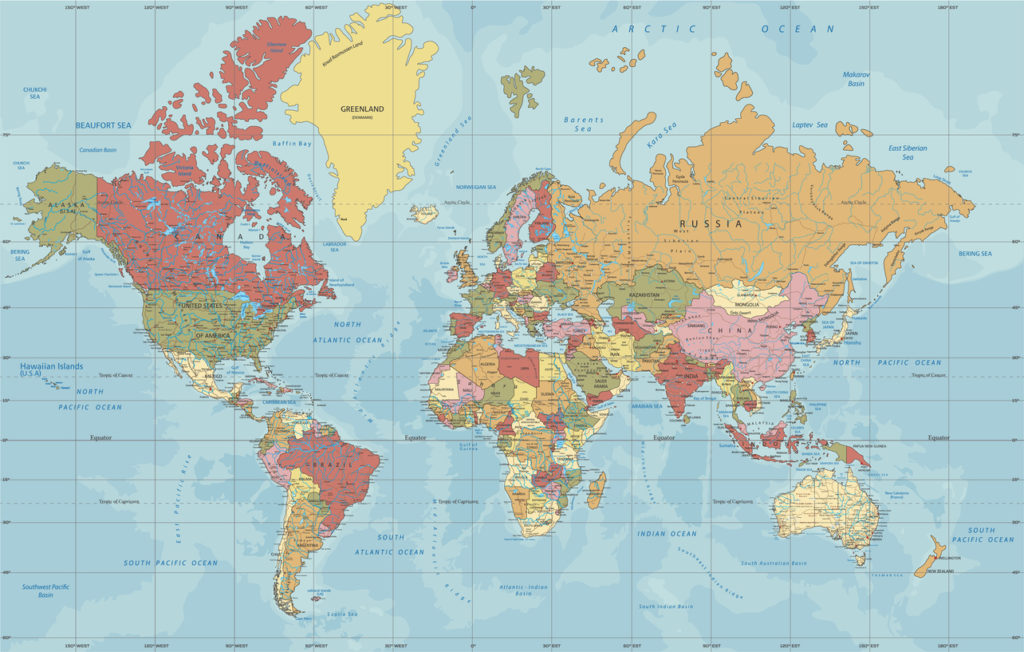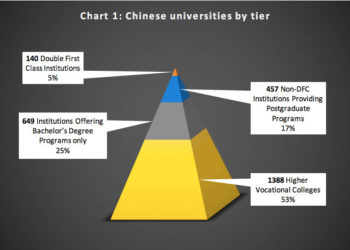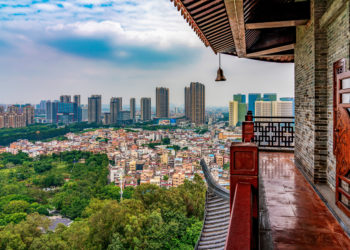As someone who first visited the US and now live here, I am often amazed at how different things look through the eyes of a visitor compared to those of a resident. In this post, two colleagues, both of whom are originally from the UK and have lived for many years in a foreign country, shared their experience of living as an alien in a very different culture.
Amanda Laverick is currently working as a freelance Project Manager and President of the New Mothers’ Support Group, Singapore. Formerly COO of Charlesworth China, Amanda lived in Beijing, China from 2005-2012; Jakarta, Indonesia from 2012-2015 and has been in Singapore since 2015.
Adrian Stanley is the Past President for the Society for Scholarly Publishing. He is also the Managing Director, Publishers at Digital Science, and an Associate Editor for Learned Publishing. Adrian lived and worked in Beijing, China from 2000 to 2004, and now lives in the US.

What were the most common questions you were asked when living in a foreign country?
Amanda Laverick (AL): The questions I was asked most were:
- Where are you from? When I answered “the UK”, it normally then went along the lines of “Oh, London?”. I would then try to explain which part of the UK I was from. I found it pretty interesting that 10 years ago most people only knew about London and not much further afield, whereas these days people seem to have a good knowledge of major cities in the UK.
- What do you miss the most about home? For me it was always family and friends, but initially I would also miss smaller things like food, news, or a decent pub. Nowadays you can get most things “from home” except your family of course, and you find ways to communicate and handle the relationships from afar. I certainly don’t miss the weather, but I do miss the seasons when living in Singapore.
- How is your Chinese? Terrible. My early years in Beijing were difficult without the language, however most people were kind and I could manage to get by. As time went on, I learned a little, but was nowhere near as fluent as my time there would have suggested, so it became more embarrassing to answer this question.
Adrian Stanley (AS): The questions that I was frequently asked were pretty much the same as Amanda. Chinese is a hard language to learn with 4 different tones/inclinations and over 8000 characters. It’s also not easy to learn/study after 10-12 hours’ daily work, as we did in the early days of opening a new office. On reflection, a 3-6 months Chinese language immersion period without work would have helped immensely, and something I’d recommend if you are serious about doing business in China.
Have any of your original perceptions of a culture changed after living for years in that culture?
AL: One thing that’s often talked about in Western culture in relation to China is guanxi. I thought this was just a matter of building a network, but now I understand that it goes deeper than that and believe a “foreigner” can never have true guanxi but can build business relationships in the same way as anywhere (with slightly more banquets).
I also believe that underneath all the “cultural” elements people talk about being different, the fundamentals are the same no matter where you come from. People want the best for their family and will work hard for that in some way or another.
AS: While living in China, I realized that China thinks and plans in terms of the next 5-25 years, whereas in the West, we often think more in terms of the next fiscal quarter and year ahead. Understanding that there is a longer term 5-25 year plan can be a thing of beauty. The other key point when you don’t speak a second language fluently, you realize that a number of your other senses are heightened, and you pick up a lot more on the non-verbal communications, body language, mood, and energy. The amount of building, real estate development, and city planning throughout China is certainly at another level, beyond my original imagination.
What are the biggest differences in communicating with people in different countries?
AL: An understanding of peoples’ culture is important. I tend to be sarcastic which often doesn’t go down well cross-culturally as people don’t understand the meaning. I’ve found that I have to be careful with that until I really know people. Relationships can develop quicker in friendships when most people you meet are also overseas. This can bring a common bond immediately, so making friends maybe quicker whilst abroad than at home.
However, the way to deal with customers, I found, is the same: being respectful, listening carefully, providing a good service, ensuring that everyone is on the same page of understanding, and documenting everything so everyone involved can review the agreements/discussions to ensure everything is clear.
AS: Living in a foreign country, you gradually become more aware of subtle nuances and cultural norms. In China the issue of ‘face’ or ‘losing face’ is something to be aware of, at least until you have built up trust and understanding together. Even between the US and UK there are subtle differences you notice, from strategy in playing games like pool or darts on a social outing, to level of openness in business (Brits tend to be a little more reserved and play a safety game at pool, while Americans are more willing to go for their shots, and frown if you play in an ultra-cautious way, in my experience). In China, when someone’s first language isn’t English, clear and simple written instructions to support verbal instructions are useful. It can allow time to use online translation tools. Sports, specifically football (soccer) was a unifying universal language during my time in China.
Has the experience of living in a foreign country left any mark on you?
AL: Definitely, I believe I am now more open to people from all nationalities and backgrounds. I came from a relatively small town in the North of England and moved to Beijing for 7 years, Jakarta for 1 year, then have been in Singapore for nearly 5 years. Meeting people from all over the world has made me more tolerant of different cultural aspects (maybe not the same as in my home country but still equally as valid). I’m more adaptable to change and things not being the norm, and have become more open to new people. All the places I’ve lived have had a transient expatriate population where people come, you make friends, then they move on and the cycle starts again (or you are the one moving on). I have often found it difficult to integrate with the local community, but I try my best to understand the local habits and lifestyles of the places I’ve lived. I would find it difficult to move back to a smaller place with less diversity. Living abroad brings a lot of interesting dynamics to daily life that I wouldn’t experience back home.
AS: I agree with Amanda. Living in a foreign culture also makes you realize how you (and others) have biases partly built on stereotypes and generalized perspectives. Once you actually spend time with people in other cultures and countries, get to know them, listen and talk, you find these perceptions are often misguided. People are people all around the world. Look for what’s special and unique about them, and keep an open mind.
Has your perception of your home country changed as a result of living overseas for an extended time and what would be the challenges of “repatriating”?
AL: I feel the opportunities in my home country are not as broad. Living overseas seems to offer the chance to go anywhere or do anything. It also depends on where in my home country I was to go to. Going back to a small Northern town wouldn’t be the same as, say, relocating to London in terms of job opportunities within my field. So, I guess repatriating to the UK but to a different city might not be that tricky in the long run.
The challenges would be getting used to longer planning time scales. Things can be done very quickly here in Singapore, whereas in the UK I get the impression that things are planned and scheduled months in advance, quite a different dynamic to work with.
Being a foreigner overseas always makes you “different” somehow, no matter how long you have lived somewhere you are always an expat to some extent so being back “home” without that difference would be an interesting challenge as it can often work in your favor overseas.
AS: I enjoy going home from time to time, the bright green fields of England, the rolling hills, moors, castles, history, and culture do stand out, when you haven’t seen them for some time. But I think once you have lived abroad, there is a sense of exploration and adventure within your bones and DNA, and no real desire (as of yet) to go back and live back where you were born. You know it’s your roots and heritage, but there’s something unique and different about living in another country. I do also feel America is the land of opportunity, on a very different scale.
Do you have any suggestions for people who want to start doing business in China?
AL: Go for it! But make sure you understand your market and what you are trying to achieve. Network like crazy. Join your local Chamber of Commerce/Embassy and get as much knowledge as you can before you start. Find any conferences/exhibitions related to your area of business and attend if you can, to find out who else is in the arena. Research the different avenues for foreign investment, the limitations and scope of those and how they would fit with your business now and in the future. Listen to the market and understand if your business will do well there. There are a lot of excellent home-grown businesses and the customer base is loyal in the main. Find someone local to help you navigate and build your business.
AS: Make time to get to know the people you are hoping to do business with. It’s not unusual to have 4-5 dinners and lunches to get to know each other. Have a local person with you, too, who understands these cultural practices. I was once supporting a visitor coming to the Beijing Book Fair. They were hoping to set up a stream of meetings every 30 minutes for 3 days, like one might do at Frankfurt Book Fair. We revised this plan to identify quality over quantity. Note it’s also looked on favorably if you take time to get to know a country’s history and culture (visit the Great Wall, or Forbidden City if it’s your visit trip to China).
Discussion
4 Thoughts on "Living and Working Abroad: An Interview with Amanda Laverick and Adrian Stanley"
Thanks! This was a joy to read.
Adrian: thank you for this sharing. As I know, European, especially UK publishers, were the first to set up offices in China. This seems to be contrary to how they play pools or darts?
Thanks Tao for organizing us to share our experiences. On the pool and darts question, I actually think/believe there is a different level of strategy/insight, just because one might play in a slightly more reserved way, doesn’t mean you haven’t done all your due diligence, weighed up your odds, assessed the risk, and made the decision which shot or opportunity to make … it’s not really apples to apples (and the pool/snooker tables have different sized pockets 😉 but that’s how I saw these nuances and similarities. The one thing though about working and living abroad is you make some wonderful friendships, and meet the most amazing people … who’d have thought we’d all be blogging together now, when we first met in 1999?
Thanks for sharing this interesting article Tao Tao, enjoyed reading it and learning people’s experiences in living and working abroad.
Amanda is spot-on regarding the concept of ‘guanxi’, such a delicate maneuver to master!



